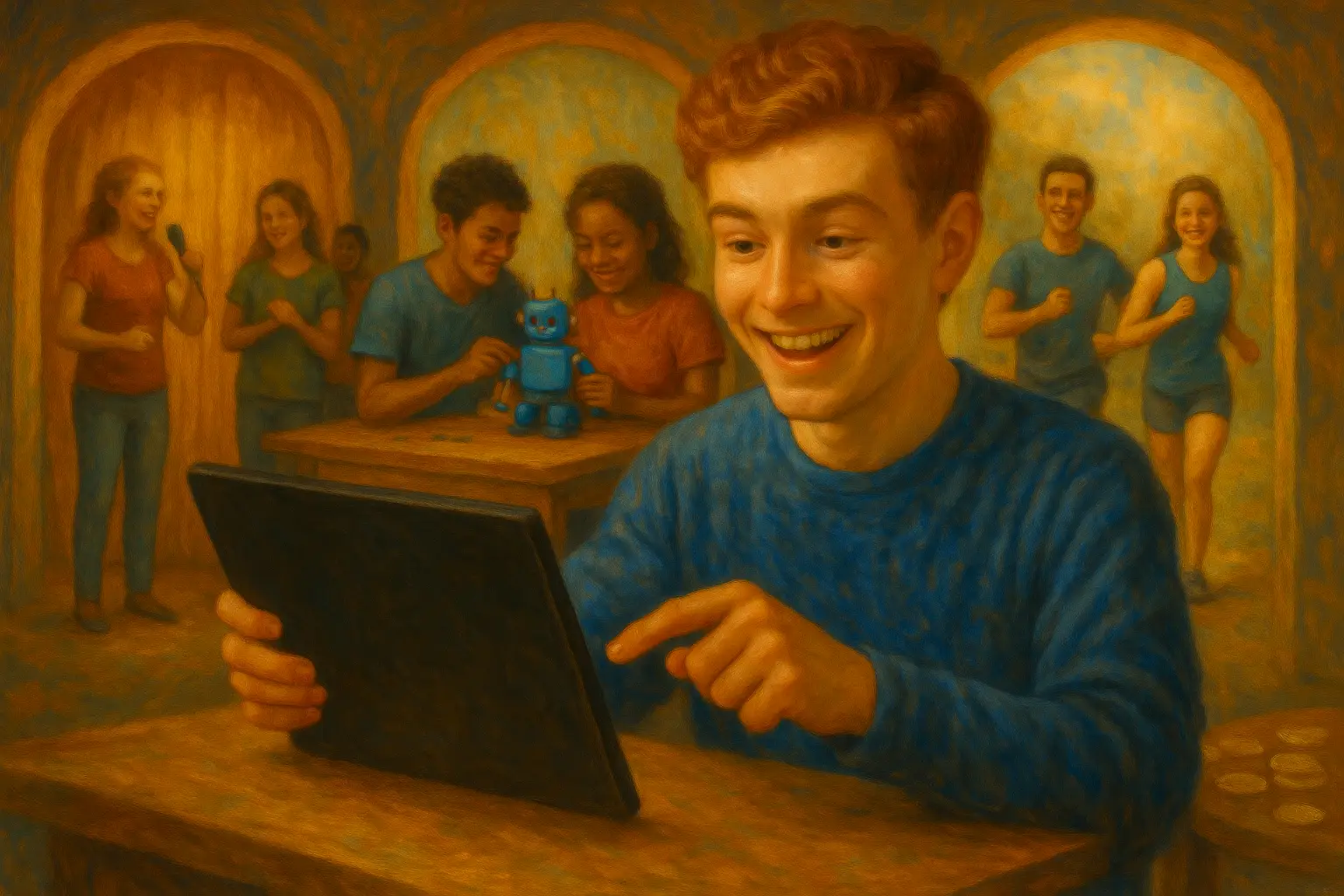Introduction: Why “Loving School” Matters More Than Ever
Ask any parent what they really want for their child at school and you’ll usually hear two goals: strong academics and genuine happiness. Traditional classrooms often deliver one at the expense of the other. Alpha School, a secular Pre-K–12 network headquartered in Austin, Texas, set out to prove you can (and must) have both.
Co-founder and principal Joe Liemandt often says, “We want to build it so the kids want to go to school instead of going on vacation.” It sounds audacious—until you see the data. Alpha students finish core academics in two hours each morning yet out-perform peers nationwide on MAP and AP exams, and they routinely ask to cancel summer break so they can keep learning.
What makes that possible? Motivation. In Alpha’s own words, “ed-tech is only 10 percent of the solution; motivated students are the other 90 percent.” This article unpacks why motivation is so pivotal to Alpha’s success and how the school intentionally engineers it inside every child.
The Science Behind Motivation and Accelerated Learning
1. Motivation Drives Engagement—and Engagement Drives Retention
Neuroscience is clear: when learners feel autonomous, challenged at the right level, and emotionally safe, the brain releases dopamine that locks new information into long-term memory. Conversely, boredom or chronic failure triggers stress hormones that stifle learning. Alpha’s model tackles both problems head-on:
- No more boredom: AI tutors adjust content in real time, so lessons are never too easy.
- No more frustration: If a child missed a fourth-grade fraction concept, the system reteaches it immediately instead of plowing ahead.
2. Mastery-Based Progression Builds Confidence
Traditional schools let students advance with 70 percent accuracy. That leaves “Swiss-cheese” knowledge gaps that compound over time. Alpha requires ≥ 90 percent mastery before moving on, reinforcing a “competence–confidence loop” that fuels intrinsic motivation.
3. Time Efficiency Rewards Effort
Because Alpha’s AI compresses a full grade level into roughly 20–30 academic hours, students see a direct payoff for sustained focus: finish the day’s rings and you gain four hours for passion projects. The brain loves immediate, visible rewards.
The Five Pillars of Motivation at Alpha School
Pillar 1 – “Time Back”: The Two-Hour Academic Day
What parents see: Each morning students work through four 25-minute Pomodoro learning blocks that cover their core subjects.
Why it motivates: Childhood is scarce time. When kids realize they can trade 2 hours of concentration for 4 hours of creative freedom, they start defending focus time—not the adults. Liemandt calls it the “single biggest effect-size on engagement.”
Pillar 2 – Personalized, Interest-Based Lessons Powered by AI
Alpha’s proprietary Incept Engine builds each lesson from two real-time views: what the student has already mastered and the pop-culture topics that excite them (informally called a “knowledge view” and an “interest view,” but not official product labels).
A fifth-grader who loves soccer may practice fractions by calculating goal-shot ratios; a Swiftie might learn World War I through a “Taylor Swift drama” analogy. Personal relevance keeps curiosity—and dopamine—flowing.
Pillar 3 – High Standards and High Support from Guides
Alpha’s adults aren’t “teachers” in the lecture sense. They’re guides—former coaches, entrepreneurs, or public-speaking pros—paid a minimum of $100 K to do three things:
- Know every child’s goals and stressors.
- Hold them to lofty standards (≥ 90 percent mastery, leadership roles, public showcases).
- Offer relentless emotional support. <u>Student surveys ask whether their guide “is one of the adults who will transform my life.”</u> Scores drive internal accountability.
Pillar 4 – Gamified Feedback & the Alpha Economy
- Visual rings: Like an Apple Watch, rings close only when a Pomodoro is finished at mastery.
- Waste meter: A computer-vision tool flags off-task scrolling and shows how many minutes a student is “burning.”
- Alpha Bucks: Completing milestones earns digital currency students can trade for passion-project supplies or <u>investing.</u>
- Entire cohorts that beat their collective goals unlock celebrations such as a campus petting-zoo visit.
Gamification reframes hard work as a strategy game students want to win.
Pillar 5 – Real-World Life-Skills Workshops
Afternoons are reserved for “high-challenge, high-joy” projects:
- Entrepreneurship: Fifth-graders first managed an Airbnb project and later ran a profit-positive food truck.
- Fitness & Grit: Second-graders used Atomic Habits to train for a 5 K, turning tears of doubt into finish-line triumph.
- Public Speaking: Students rehearse mock press conferences at Austin FC’s MLS stadium.
- Financial Literacy: Middle-schoolers earn Alpha Bucks, then invest them (50 percent early-withdrawal penalty included).
When children see schoolwork translate into money, leadership roles, or public performances, effort feels deeply worthwhile.
Proof of Concept: What the Numbers Say
| Metric | Alpha School Result | Typical U.S. School |
| Daily academic seat-time | 2 hours | 5.5–7 hours |
| MAP growth (mid-year) | <u>Described by Alpha leadership as roughly double typical growth (no published percentages)</u> | Baseline |
| AP World History | 100 % scored 5 in ≤ 75 hours of prep | 13 % national average |
| Student sentiment | Most students vote to cancel summer break | — |
One striking example: a student stuck at 740 on SAT Math jumped to 790 after Alpha diagnosed missing third-grade fact fluency—proof that small, personalized fixes can produce elite results.
FAQ: How Parents Can Evaluate Alpha’s Motivation Formula
Q1. Does two hours of screen time hurt attention spans?
Alpha distinguishes high-value screen time (interactive tutoring, immediate feedback) from passive scrolling. Afternoon workshops are purposely off-screen to balance the day.
Q2. What if my child is behind (or ahead) of grade level?
Because the AI tutor teaches to knowledge—not age—the same system catches kids up and lets gifted learners leap ahead. Catch-up typically takes 20–30 hours per subject per missing grade.
Q3. Aren’t cash rewards (Alpha Bucks) just bribery?
Research shows tangible rewards can kick-start engagement, but long-term motivation sticks only if students then internalize the value. Alpha transitions external rewards into intrinsic pride through mastery displays and passion projects.
Q4. How do guides track each child’s motivation triggers?
Guides keep running notes on which motivational levers work for each learner and compare insights in weekly team huddles.
Why Motivation Matters for the Future of K-12
The industrial classroom model was never designed for personalization or student joy; it was built to batch-process knowledge. Alpha School’s experiment suggests a different paradigm:
- Personalization + Mastery makes learning efficient.
- Motivation + Real-World Purpose makes learning stick.
As AI tutoring costs drop—Liemandt expects that within the next five years a tablet costing under $1,000 could handle a child’s academics in two hours—every school, public or private, will face a question: If core subjects can be mastered quickly, how will you use the rest of a child’s day?
Alpha’s answer is to double-down on motivation, life skills, and mentorship. Early evidence shows it works. For families tired of choosing between academic rigor and genuine enthusiasm, that’s a revolutionary promise.
Key Takeaways for Parents
- Motivation isn’t fluff—it’s the engine of retention and accelerated mastery.
- Alpha engineers motivation through time freedom, personalized AI lessons, high-paid guides, gamified feedback, and life-changing workshops.
- Results speak: twice-the-growth in half the time, with students begging for more school.
- The model scales: as AI costs drop, expect micro-schools and even home-school versions built on the same motivational science.
- If your child dreads the morning bell—or you’re simply curious whether school can be both rigorous and joyful—Alpha School is a case study worth watching.




